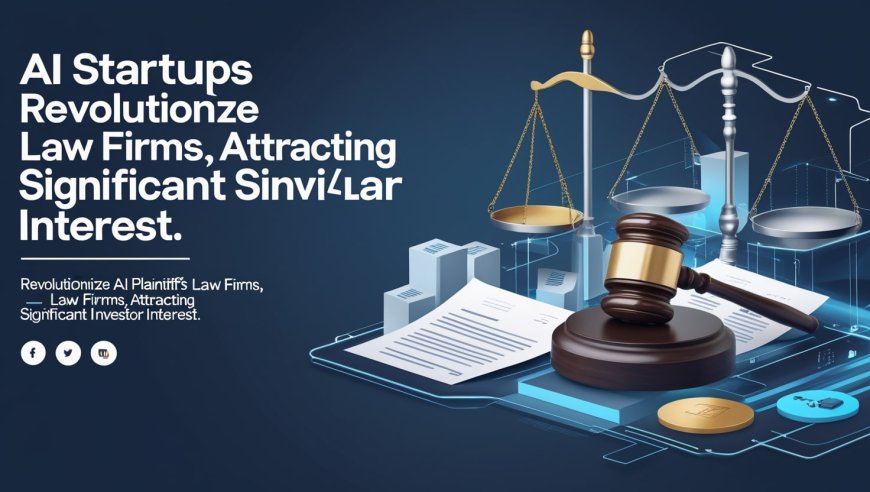AI Startups Revolutionize Plaintiffs' Law Firms, Attracting Significant Investor Interest
Artificial intelligence startups are transforming plaintiffs' law firms by enhancing client intake, case evaluation, and document drafting, leading to substantial investments from major venture capital firms.

In recent years, artificial intelligence (AI) has made significant inroads into various industries, and the legal sector is no exception. A new wave of AI startups is focusing on plaintiffs' law firms, offering innovative solutions to streamline operations, enhance client services, and improve case outcomes. This trend has not gone unnoticed by investors, who are pouring substantial funds into these ventures, recognizing the potential for AI to revolutionize legal practices.
Eve: Enhancing Legal Workflows
One notable example is Eve, an AI startup that recently secured $47 million in a funding round led by Andreessen Horowitz, with participation from Lightspeed Venture Partners and Menlo Ventures. Eve's platform is designed to improve workflow and transparency for personal injury law firms by enhancing client intake, case evaluation, and document drafting. By automating these processes, Eve enables firms to handle cases more efficiently, allowing attorneys to focus on strategic legal work rather than administrative tasks.
EvenUp: Leveraging AI for Case Preparation
Another significant player in this space is EvenUp, which raised $135 million in October 2024. EvenUp utilizes AI to assist personal injury attorneys in preparing demand packages—a critical component in the pre-litigation phase. The platform analyzes case details and generates comprehensive demand letters, ensuring that all pertinent information is included and presented persuasively. This not only saves time but also increases the likelihood of favorable settlements for clients.
Supio: Streamlining Mass Tort Litigation
In August 2024, Supio, an AI platform tailored for personal injury and mass tort plaintiff law firms, announced a $25 million Series A funding round led by Sapphire Ventures, with participation from existing investors Bonfire Venturesand Foothill Ventures. Supio's generative AI technology streamlines the management of mass tort cases by automating document review, case organization, and client communications. This allows firms to manage large volumes of cases more effectively, improving both efficiency and client satisfaction.
The Broader Impact of AI in Legal Practice
The infusion of AI into plaintiffs' law firms is part of a broader trend of technological innovation in the legal industry. AI tools are proving valuable for both plaintiffs' and corporate law firms, attracting hundreds of millions of dollars from investors. These technologies are not only enhancing efficiency but also transforming the way legal services are delivered. For instance, AI is being used to automate contract drafting, conduct legal research, and predict case outcomes, thereby reducing costs and improving accuracy.
Investor Confidence and Market Potential
The substantial investments in AI startups catering to plaintiffs' law firms reflect a strong confidence in the market potential of these technologies. Investors recognize that the legal industry, traditionally slow to adopt new technologies, is ripe for disruption. The ability of AI to automate routine tasks, analyze large datasets, and provide predictive insights offers a compelling value proposition for law firms seeking to improve efficiency and remain competitive.
Challenges and Considerations
Despite the promising developments, the integration of AI into legal practice is not without challenges. Concerns regarding data privacy, ethical considerations, and the need for transparency in AI decision-making processes are paramount. Law firms must ensure that AI tools are used responsibly and that they complement rather than replace the nuanced judgment of experienced attorneys. Additionally, there is a need for ongoing training and education to ensure legal professionals can effectively leverage these new technologies.
Future Outlook
As AI continues to evolve, its applications in the legal sector are expected to expand further. Future developments may include more advanced predictive analytics, enhanced natural language processing capabilities, and greater integration with other legal technologies. The continued collaboration between AI startups and law firms will be crucial in driving innovation and ensuring that these tools meet the specific needs of legal practitioners.
Conclusion
The emergence of AI startups focusing on plaintiffs' law firms represents a significant shift in the legal landscape. By automating routine tasks and providing advanced analytical capabilities, these technologies are enabling law firms to operate more efficiently and effectively. The substantial investments from leading venture capital firms underscore the confidence in the transformative potential of AI in legal practice. As these technologies continue to mature, they hold the promise of not only improving the operations of law firms but also enhancing access to justice for clients.

